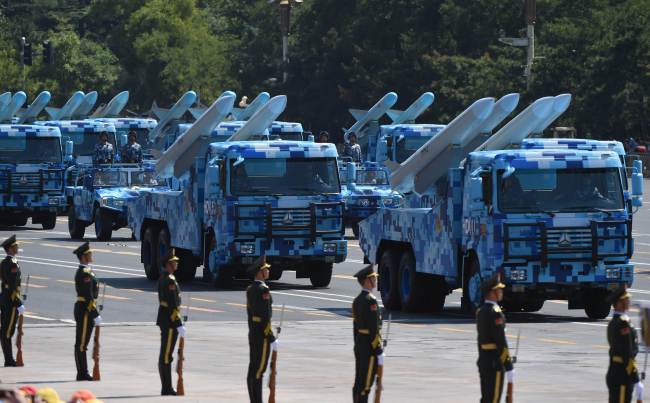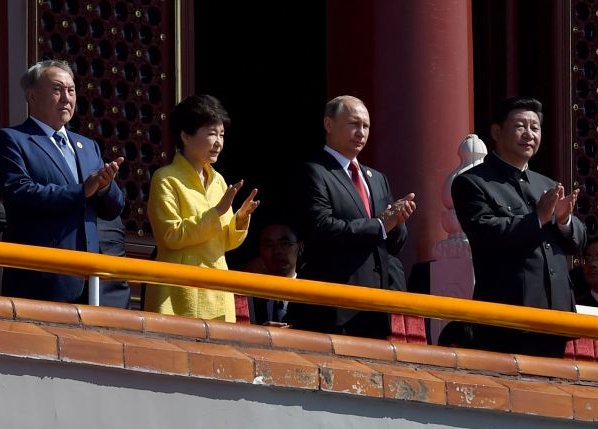South Korean President Park Geun-hye on Thursday attended the flamboyant military parade in Beijing, bolstering China’s show of rising military power in exchange for their closer regional, political and economic cooperation.
Wearing a golden jacket and sunglasses, Park stood second right to her Chinese counterpart Xi Jinping, a prominent position on the balcony of the Gate of Heavenly Peace at Tiananmen Square, which illustrated much closer ties between the two.
She was the only U.S. ally to attend the event shunned by many Western leaders concerned of China’s growing influence in territorial disputes.
It was the same site where former North Korean leader late Kim Il-sung attended to mark the fifth anniversary of China’s foundation day on the invitation of Mao Zedong in 1954.
Sixty-one years later, the South Korean leader, not North Korean, standing close to Xi, signified the evolving ties between the two and the changing dynamics in the region. It also reflected that the traditional ties between China and North Korea is not as it used to be. North Korean leader Kim Jong-un skipped the event but instead sent Choe Ryong-hae, high-ranking member of its ruling Workers’ Party, to Beijing.
Though Park and Choe were sitting on the rostrum during the 90-minute parade, she didn’t encounter the North Korean official. They also didn’t meet at the welcoming banquet hosted by Xi on Wednesday night, said Cheong Wa Dae. The North Korean official was sitting at the end of the first row on the balcony, far from the center where Park was standing with Xi and Russian leader Vladmir Putin as well as former Chinese leaders, including Jiang Zemin and Hu Jintao. Other dignitaries included U.N. Secretary-General Ban Ki-moon, former South Korean foreign minister, and leaders of Kazakhstan and Venezuela.
 |
Military vehicles participate in a military parade at Tiananmen Square in Beijing on Thursday to mark the 70th anniversary of victory over Japan and the end of World War II. (AFP-Yonhap) |
The parade held to celebrate what China calls “Victory of the Chinese People’s Resistance Against Japanese Aggression and World Anti-Fascist War,” was seen as Beijing’s attempt to highlight Japan’s surrender in the war and to push for a much bolder nationalist agenda amid growing fears of an economic slowdown.
The ceremony commenced with a 70-gun salute and was followed by a cavalcade of gleaming high-tech weaponry, 11,000 goose-stepping soldiers and fighter jets. It also featured inter-continental ballistic missiles, ZTZ-96A main battle tanks, HJ-12 antitank missiles and H-6K mid-range strategic bombers, according to China’s state-run Xinhua news agency.
During the ceremony, Xi said that China would remain committed to peaceful development and pledged to cut the army’s size by 300,000 troops. China’s People’s Liberation Army currently has 2.3 million service members.
“We Chinese love peace. No matter how much stronger it may become, China will never seek hegemony or expansion. It will never inflict its past suffering on any other nation,” Xi said.
 |
South Korean President Park Geun-hye, Russian President Vladimir Putin (second from right), Chinese President Xi Jinping (right) and Kazakhstan President Nursultan Nazarbayev (left) applaud during a military parade in Tiananmen Square in Beijing on September Thursday to mark the 70th anniversary of victory over Japan and the end of World War II. (AFP-Yonhap) |
Having donned the golden jacket that symbolizes “good fortune” in China, Park was greeted by Xi and his wife Peng Liyuan before heading to the viewing stands. At a photo session that followed, she stood to the left of Xi’s wife. The arrangement at the photo session was seen as China’s special hospitality toward Park.
China has set up a special reception team for Park under the instruction of Xi, calling her one of the most important guests, said Blue House spokesman Min Kyung-wook. China has also provided an exclusive waiting room for Park ahead of a luncheon reception hosted by Xi after the military parade, he added.
The parade was held a day after a landmark summit between Park and Xi, in which they pressed North Korea, saying that they are opposed to any action that causes tension on the Korean Peninsula. The two also called for resumption of the long-stalled six-way talks to curb North Korea’s nuclear ambition as soon as possible, and agreed to hold a trilateral meeting with Japan “at a convenient time” in late October or early November.
At the welcoming banquet on Wednesday evening, Park and Putin also discussed ways to resolve tension on the Korean Peninsula and improve ties between South Korea and Russia, Cheong Wa Dae said.
Though the presidential office didn’t elaborate, the two leaders appear to have talked about various issues, considering that they were sitting next to each other for 80 minutes during the official dinner. The two may have discussed ways to develop the relationship between the two that marks the 25th anniversary this year and also about the future of the inter-Korean ties amid tension abating after the breakthrough talks last month.
Later in the afternoon, Park headed to the southern Chinese city of Shanghai. She plans to attend the reopening ceremony of the headquarters of the Korean Provisional Government and a business forum before returning home on Friday.
By Cho Chung-un (
christory@heraldcorp.com)









![[Today’s K-pop] Blackpink’s Jennie, Lisa invited to Coachella as solo acts](http://res.heraldm.com/phpwas/restmb_idxmake.php?idx=644&simg=/content/image/2024/11/21/20241121050099_0.jpg)